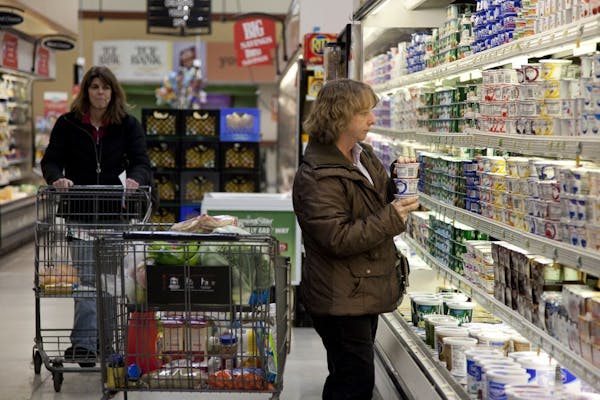It's all smiles when big acquisitions close, the executives raising a glass with their lawyers, lenders and investment bankers. Then they get to talk up the deal to the press and shareholder base.
"This is the largest day in Supervalu's history," then-CEO Jeffrey Noddle said in June 2006, upon the closing of a deal that transformed Supervalu by bringing more than 1,100 stores that had been part of Albertsons Inc. into Supervalu.
So we already know when the second-largest day will be, maybe a day that concludes with a far more muted celebration. It's when the transaction Supervalu announced Thursday closes, one that essentially unwinds that 2006 deal.
In the new deal Supervalu will sell a total of 877 stores, including its Albertsons, Acme, Jewel and Shaw's/Star Market chains, to an investment group led by the private equity firm Cerberus Capital Management.
The value to be realized by Supervalu is almost all in the form of the liabilities it sheds -- about $3.2 billion in debt in a deal that also rids Supervalu of $1.2 billion in pension liabilities. Only $100 million of the proceeds will be in cash.
It's not exactly an apples-to-apples comparison, but Supervalu paid $2.7 billion in cash and $2.3 billion in stock and took on $6.1 billion in Albertsons debt plus other liabilities for much the same set of assets in June 2006.
The deal then was well-received, and it was only well down the road that the investment community soured on it. It turned out there were too few strategically solid chains, too many operating complexities and too much debt, particularly a debt load that may have hindered the ability to be more aggressive on retail pricing.
The Kroger Co., the most respected big traditional grocery operator left in the business, started lowering its prices to compete with the likes of Wal-Mart Stores Inc. more than a decade ago. Supervalu did, of course, tweak pricing, but it was only last summer that the company announced a plan to get far more aggressive.
That same day, Supervalu announced the appointment of investment bankers to find out what options Supervalu's board had in selling all or part of the company, a process that culminated in Thursday's announcement.
The theme of CEO Wayne Sales on a call for investors Thursday was that the divestiture "de-risked" the company, and it is certainly true that the 2006 deal added plenty of operating and financial risk.
Sales, who will give way to new CEO Sam Duncan upon closing, said the stores that are staying are "more regional. And they require less investment in price [reductions]. So we have, again, less to distract us ... and we can put absolute focus on the 191 retail stores that we have left."
A smaller Supervalu means "providing more bandwidth and leadership focus on our legacy business," he explained, and a stronger balance sheet assures customers and suppliers that the bills will be paid.
What Sales described was a Supervalu that looks very much like the Supervalu of fiscal 2006, the last full year before it turned into the nation's third-largest grocery chain operator. Revenue that year was $19.9 billion, vs. the slimmed down company's expected annual revenue of more than $17 billion.
The company then serviced about 2,200 independent stores through its wholesaling operation, versus about 1,950 how. It had about 1,150 Save-A-Lot "hard discount" grocery stores vs. about 1,300 Save-A-Lot stores now. And it operated about 225 other grocery stores vs. the 191 stores it will have going forward.
But it is not as simple as rewinding the tape and choosing a different path. Then, the industry was trying to figure out the long-term competitive response to the low-cost threat of Wal-Mart.
Wal-Mart has gotten much stronger since, Target Corp.'s grocery business has blossomed, and Costco Wholesale Corp. has opened more than 100 more U.S. locations since the end of its 2005 fiscal year.
The competitive pressure pushed down identical-store sales in the Save-A-Lot unit by 4.1 percent in the just-announced quarter, and operating earnings were down. Sales were flat during the quarter in Supervalu's wholesaling unit but operating earnings declined in this unit as well, and its customers are, as one analyst put it, "fast becoming businesses of the past."
In thinking back to 2006, it's hard to think of a single challenge Jeff Noddle faced then that new CEO Sam Duncan will not confront his first day, except now the challenges seem more pressing.
Outgoing CEO Sales alluded to the hard work ahead in response to an analyst who wanted to know if the Cerberus deal concluded the strategic review process he started last summer.
No more assets are being shopped, he said, but "the strategic process is never finished. Nothing in retail is ever finished."
lee.schafer@startribune.com • 612-673-4302

Schafer: What do you really need to retire?

Schafer: How doing business can be a bit more like Christmas morning

Schafer: There won't soon be another opportunity to rethink the I-94 corridor

Schafer: The fruits of Honeywell's long-game dedication to quantum computer now being seen


